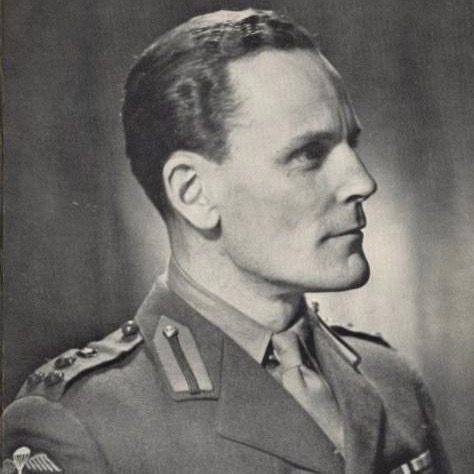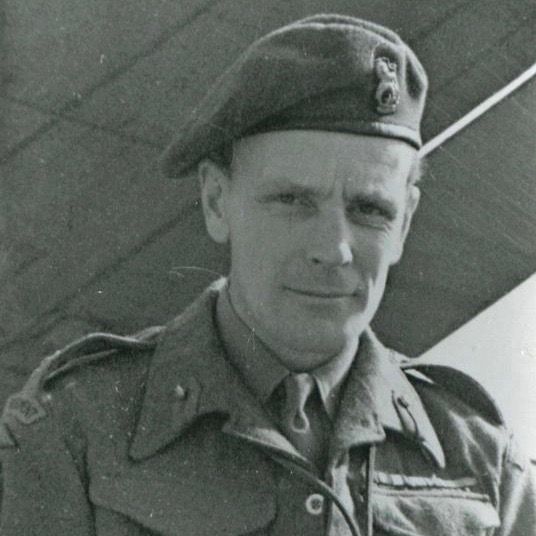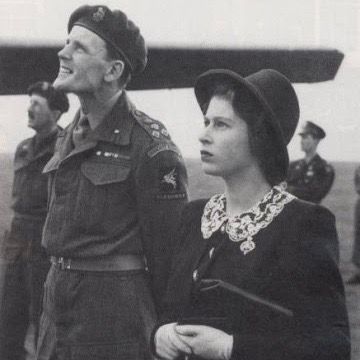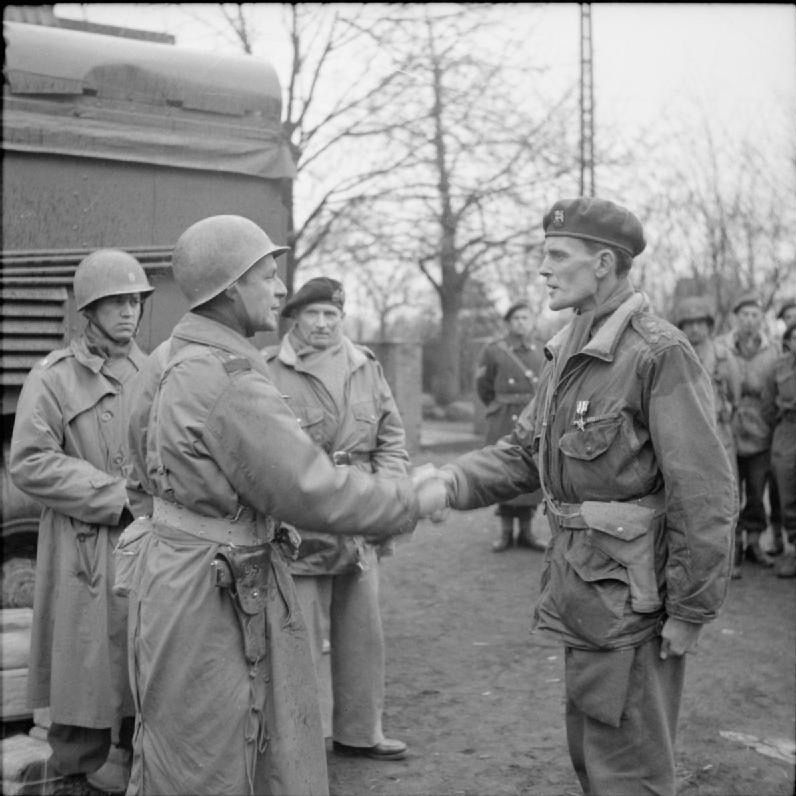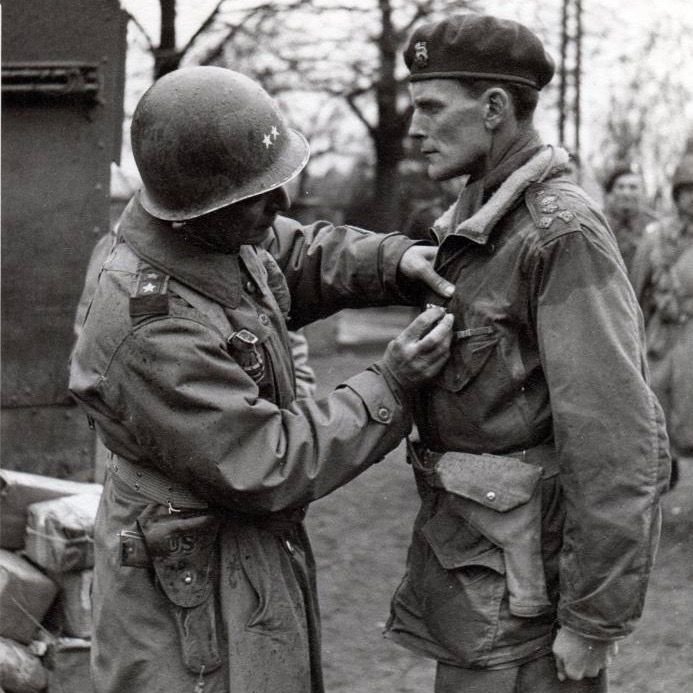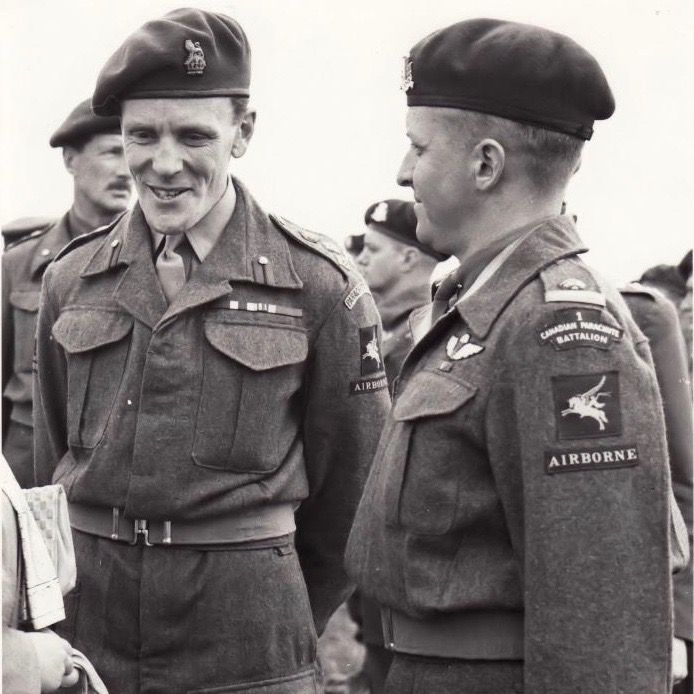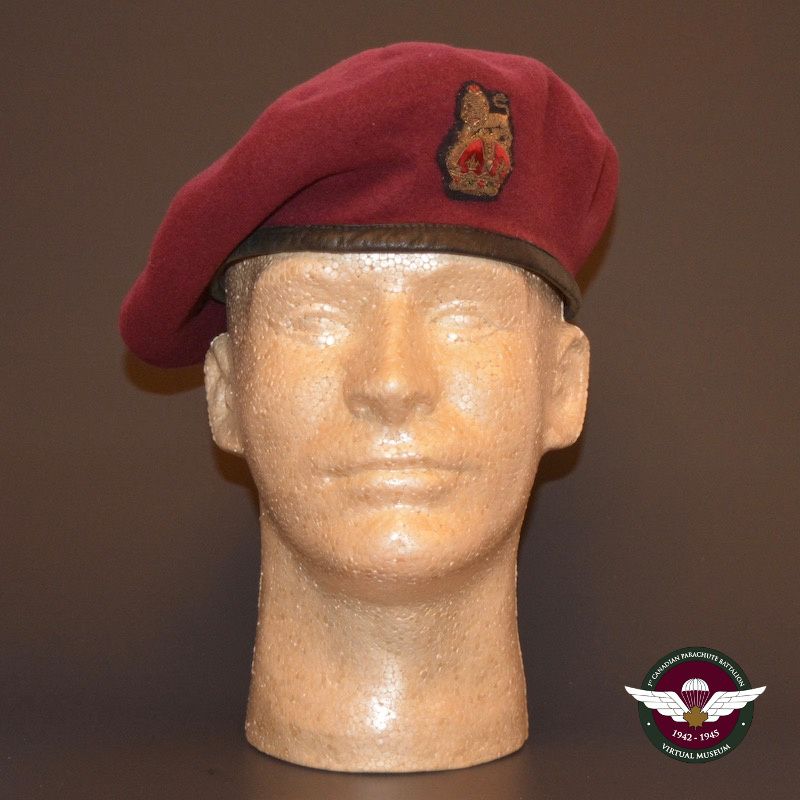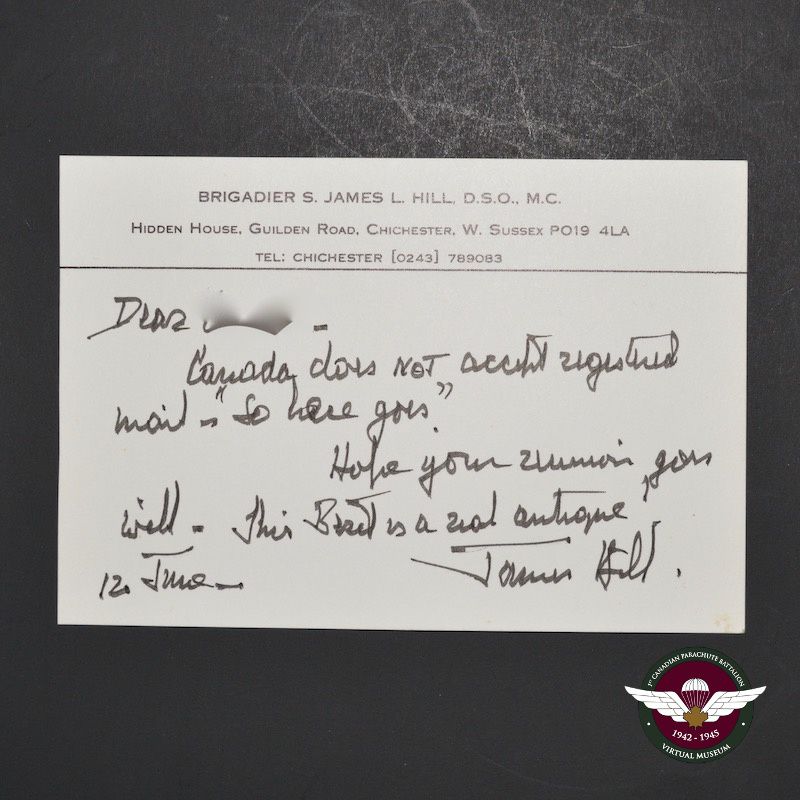BRIGADIER JAMES HILL, D.S.O., M.C.
Brigadier James Hill was a World War II Commander, who joined the British Airborne Forces at an early stage, fought in North Africa and went on to play a vital role in the D-Day landings and the crossing of the Rhine.
After education at Marlborough and Sandhurst, Hill joined the 2nd Battalion Royal Fusiliers, the family regiment, in 1931. Although he left the regular army in 1936 to marry, he rejoined at the outbreak of war and was immediately sent out to France spending a very cold Christmas in 1939 on the Maginot Line.
By May 1940 he had become a member of Lord Gort’s Command Post and was given the task of organising the evacuation of the civilian population from Brussels, following the German invasion. He referred to this as a ‘glorious nightmare’ with cars streaming out of Brussels at a rate of 4,500 per hour mixing with hordes of pedestrians, carts, livestock and a sprinkling of unarmed Belgian soldiers. Later he was ordered to deliver despatches to Calais, and moved onto Dieppe where he hitched a lift on a destroyer which was scheduled to go back to Calais. He fell asleep and awoke, somewhat shocked, to find the destroyer berthed in Dover! Realising it was a career limiting move to end up back on home turf ahead of one’s commanding officer, Hill negotiated a return to Calais in an ammunition barge! During the last stages of withdrawal he took charge of the evacuation from La Panne beach, and then made a more legitimate return to Dover on the last destroyer to leave the jetty in Dunkirk. He was subsequently awarded an MC.
In 1940 he was promoted to Major and sent to Ireland, to assist the Irish in planning the evacuation of Dublin in the event of a German invasion. (There is an amusing anecdote, not for full repetition here, about a titled lady with a snake tattooed on her inner thigh, which can be viewed in his own memoirs.)
A staff appointment at HQ Eastern Command followed on his return from Dublin.
In 1941 he volunteered to be become a parachutist; Hill maintained that the only reason he did this was to retain his batman who had volunteered for transfer! He joined the 1st Battalion as second in command, and took command in 1942.
Having sailed to Algiers for Operation Torch, the 1st Battalion then made their initial operational combat jump in Tunisia – Hill was first out of the door. An attack was organised against an enemy tank harbour at Gue Hill, near Beja. During this operation he came across three light tanks dug into the side of the hill apparently firing at random. Hill stuck his revolver into a peep hole in the first tank:
“I pulled the trigger and the bullet went wanging round inside. The roof shot open and out came Italians shouting ‘Italiano, Italiano’. This was far too good to be true – it happened twice. However, when I tried the procedure with the third tank the hole was shut and I had to bang on the turret with a thumb stick I always carried – the turret shot open and a great big German with his hands up came out. I sensed he had a weapon and as he jumped he fired his Mauser shooting me through the chest, neck and shoulder. He was a brave man. The next thing I knew was when I found myself looking at three bodies lying on the ground. I recognised the centre one as myself, the one on the left was the German and there was another on my right. In due course on coming to, I lifted myself on to my elbows and sure enough there to my left was the German and a third body lying on my right.”
In a separate incident, his adjutant had also been seriously wounded in the attack and they were both bundled into the sidecar of a captured Italian motor bike and driven six miles down a railway track, over the railway sleepers, to the Regimental Aid Post at Beja – not the most comfortable way to travel, even less so when you are critically wounded! Life saving operations were performed by Captain Charles Robb of 16 Parachute Field Ambulance. They were then forwarded to the Casualty Clearing Station at Souk el Arbour and onward to the general hospital at Algiers. During his convalescence he was awarded the Legion of Honour, and later the DSO for his actions.
In January 1942, not yet fully fit, Hill discharged himself from the hospital and returned to the battalion to find another officer had been posted to take over command from the incumbent temporary commander, Alistair Pearson. Pearson was having none of it and the men opened up a book on the CO stakes. Initially, Pearson was the odds on favourite, Hill was 5-1 against, and Lt Col Gofton-Salmond the outsider at 10-1. However, when Gofton-Salmond was posted to another unit, the odds changed and the bookmakers became rather wobbly over the eventual outcome! Hill undoubtedly could have forced the situation due to his seniority but to his immense credit realised that the men held great affection and respect for Pearson and went to speak to the Brigade Commander. It was agreed that Hill would return to the UK, not least to keep him out of trouble from the General Hospital, and the battalion’s bookies made a clean-up!
In February 1943 Hill took over command of the 3rd Parachute Brigade. In April, it was reassigned as the nucleus brigade to the newly created 6th Airborne Division, formed in anticipation of D-Day. Further restructuring took place in May with the 1stCanadian Parachute Battalion, along with the 8th and 9th Battalions of the Parachute Regiment forming the Brigade of about 2,000 men with an average age of 22.
Prior to D-Day Hill gave a pep talk to the Brigade’s officers and NCO’s ending with the immortal words: “Gentlemen, in spite of your excellent training and detailed briefing do not be daunted if chaos reigns for it certainly will”.
Shortly after midnight on D-Day Hill dropped into 4 feet of water in the flooded valley of the Dives. He eventually made it to dry land and the intended DZ and collected 42 stragglers on the way. Later as they were advancing down a lane the party was caught in an aircraft attack using anti personnel bombs and Hill threw himself on top of his mortar platoon commander from the 9th Battalion:
“I knew I had been hit and as I looked round dust was everywhere and the smell of cordite and death prevailed. I saw a leg in the middle of the track and I thought it was mine, but saw the foot had a brown boot on it and that it belonged to Lt. Peters on whom I was lying. He was dead and I wasn’t”.
Having injected the non-walking wounded with morphine Hill proceeded onto the 9th Battalion, where he was confronted by their Regimental Medical Officer, who told him that he looked bad for morale. This made him furious and he said “My bloody man, if you had spent four and a half hours making tea and then had much of your left backside removed you would not be looking your best either” The injection subsequently administered by the RMO then knocked him out for a couple of hours to allow his body some small respite.
By 11.00 hours Hill was back in business with a patched up backside and a lady’s bicycle heading for Divisional HQ. “This involved me in a downhill bicycle ride of some 2 miles and it was amusing because sometimes Germans ran across the road and at other times British and you never knew who you were going to meet next”.
While at the Divisional Headquarters the Assistant Director of Medical Services (Colonel MacEwan) told Hill that he needed to be taken off to the main dressing station for an immediate operation. Hill agreed only on the condition that the ADMS would personally take him onto Brigade HQ once the operation was finished. By the time he had come to, it was around 3.30, and Hill left Ranville sitting on the back seat of a jeep with the ADMS in the front with his driver. En route to his own HQ, 6 Germans crossed the road in front of them: “And to my astonishment the ADMS shouted to the driver to pull up, opened up the left front pocket of his jeep, took out a revolver and together with his driver set off in hot pursuit, leaving a very irritated Brigade Commander sitting gingerly in a solitary state on the back seat. Some 2 minutes later he returned looking extremely sheepish without having captured a single German!”
Hill made it to his Brigade HQ to reassume command from Alistair Pearson (8th Battalion commander), who had taken temporary charge in Hill’s absence, this time with no argument!
The battle to hold the ground they had landed on went on for several days by which time Hill’s Brigade had lost 50 officers and 1000 other ranks, around half of its strength. After crossing the Seine by the end of September, 6th Airborne Division was withdrawn to be reinforced and retrained. The Canadian Battalion did not take kindly to the re-imposition of barracks discipline and went on hunger strike. The Daily Express got wind of this and rang up Hill to ask if they could come down and investigate. Hill agreed on the proviso that he was given a couple of days to resolve the situation:
“On Sunday at 12.00 pm I summoned the whole battalion to their gym - dismissed all the officer and warrant officers, save for the RSM – listened for a brief period to what one or two had to say. I told them in no uncertain terms what I thought of them and the damage they were doing. I ordered them to go and eat their Sunday dinner. After the RSM had called them all to attention I stalked out with all the dignity I could muster. I then spent an anxious half hour at my Headquarters waiting for the result. They ate all their dinners. That was not quite all - Monday morning at 9.00 am the Brigade Major came and said six Canadians wanted to see me. I said OK. They were the six ringleaders of the hunger strike and they all came of their own volition to apologise personally. I loved that battalion more and more –it could only have happened with Canadians!”
6th Airborne Division, including 3rd Parachute Brigade, was redeployed to help rebuff the German Army’s Ardennes offensive in December 1944. At the time Hill was having plastic surgery to his backside and was delayed from joining his brigade by 48 hours. The American’s put a Dakota at his personal disposal which took Hill, his batman, signaller and jeep to within 50 miles of the battlefield. Once the initiative had been regained the Division was withdrawn to prepare for the Rhine Crossing, the largest airborne operation of the war.
The 3rd Parachute Brigade, comprising of 2,200 fighting men, was dropped in a clearing, 1000 by 800 yards, in a heavily wooded area held by German parachute troops. The drop, using pilots and planes from American Troop Carrier Command, took six minutes to conclude and was dead on target. The 1st German Parachute Army was routed and links established with the leading Allied follow up formations.
Thirty-seven days later on 1 May 1945 having fought their way on foot across some 275 miles of Germany, forcing crossings on both the River Weser and Elbe and keeping pace with the armoured divisions on their flanks, they captured Wismar on the Baltic and were the first British troops to link with the Russians.
He was briefly Military Governor of Copenhagen, before taking over command of, and demobilizing, 1st Parachute Brigade. He returned to civilian life in July 1945 and resumed his business career, which culminated with Lloyds Bank as a Director and member of the UK management committee. He remained heavily involved in Parachute Regiment affairs, raising the 4thParachute Brigade (TA) in London, commanding it from 1947 - 49 and served as Honorary Colonel of the 14th Battalion, The Parachute Regiment, from 1946 - 1951. He was much involved in the formation of the Parachute Regimental Association and served as a trustee of the Regiment’s Benevolence charity for 30 years. He also served as a member of the Regimental Council for 25 years.
James Hill died on 16 March 2006 at the age of 95.
Compiled for ParaData by Harvey Grenville based on the career notes of Brigadier Hill.
Biography courtesy of the Airborne Assault Museum, Duxford, UK.
